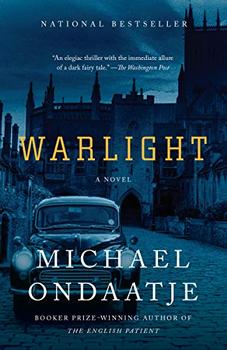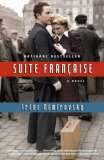Summary | Excerpt | Reading Guide | Reviews | Beyond the book | Read-Alikes | Genres & Themes | Author Bio

Just when we thought we have read all there is to read about the
horrors of WWII, along comes this book which shows us yet another
perspective—that of civilian Germans—women, children and old people fleeing
their own country in an attempt to escape west ahead of the advancing Russian
army.
An editor of historical fiction once told me that history is simply human
stories and each story is made up of several stories. In Skeletons,
Mr.Bohjalian has captured stories that might not have ever been told but surely
deserve to be heard by all who value human tenacity and cherish freedom.
Another reason I believe he "got it right" is when you find yourself thinking
about a book and its characters for days, even weeks, after you have completed
it, you know it has made an impact on you. Skeletons at the Feast was
that kind of book for me. Although it is a work of fiction, one can't easily
forget that many of the horrific events were based on what happened to real
people - a sad reminder that truth is indeed stranger than fiction. One has a
sense that the disturbing details had to have come from actual diaries because
they seem too horrible for even the most creative writer to imagine.
One reason it continues to haunt me weeks after finishing the book might be the
message implied in the title. Apparently, it was an ancient custom in many
cultures to have a skeleton at the feast to remind guests of their own
mortality. Bohjalian chose the title for similar reasons, as "a reminder
that life is indeed short and nothing is forever."
As we see the lives of these innocent people shattered, we are reminded never to
take a day for granted and that the irritations most of us face in our daily
life today are nothing compared to what these people endured.
A book like this also raises questions in any person of conscience. How would I
survive and behave in this situation? What is the dearest possession I would
take with me on the run? At what point would I give up? How much compassion
would I have to share my meager food supply with others? This book caused me to
examine my life—both its abundance and its waste.
Aside from the gripping story, fans of Chris Bohjalian (I am a self-professed
groupie) will find this book quite a departure from his previous novels. First
of all, it is not set in his beloved New England, but half-way around the world.
However, there are familiar strains that other fans will recognize from
his earlier works, such as the role of the weather. I've always felt the
weather was a major character in many of his books (the storm in Midwives,
the flood in Buffalo Soldier). In Skeletons, the weather is once
again a major force, providing yet another challenge that the characters must
endure and overcome to survive.
By telling the story from many viewpoints, using characters in varying life
circumstances, (a POW, a Jew who escapes from the train to Auschwitz, a wealthy
landowner, a young Jewish women in a death march) the story is not only richer,
but symbolically it is a further reminder of the broad impact of this war on so
many races, nationalities and countries.
As disturbing as it was to read at times, it left one feeling hopeful for the
resiliency of the human race and how hope and goodness can not only endure but
flourish after tremendous loss and suffering.
First Impressions
14 BookBrowse members reviewed this book rating it an average of 4.2 stars out of 5. Read their reviews.
About the Author
Fans of Chris Bohjalian are probably very pleased that he did not take the
advice given him by the writer-in-residence when he applied for a writing
seminar in college. After reading the short story required for admittance, the
writer/instructor "slid my short story across the expanse of the desk as if it
were a piece of profoundly disagreeable road kill. 'I have three words for you,
she said. Be a banker'."
Instead he had the courage to follow his dream and take his own advice which he
now doles out to new writers wanting to be discovered. "Have a thick skin. Read
lots and write often about things that interest you passionately. The key is to
care so deeply about a subject that you are willing to give up a year or two of
your life to it."
In addition to his books, which have been translated into 18 languages, and
published in 21 countries, he has written for a wide variety of magazines, and
has been a Sunday columnist for the Burlington Free Press since 1992 for which
he writes a weekly newspaper column called "Idyll
Banter".
In some ways it's difficult to imagine that the author of "Idyll Banter" is also
the author of Skeletons at the Feast. But on second thoughts, in
addition to seeing the lighter side of life, what comes through each week in his
column is his sensitivity and compassion—the same compassion he shows for the
characters in his latest novel.
Coming Soon: Skeletons at the Feast is the first volume in a trilogy Bohjalian plans to write about World War II. He's currently working on the next book which will be set in Florence and Tuscany towards the end of the Second World War; the third will be set on the Channel Islands.
![]() This review was originally published in The BookBrowse Review in May 2008, and has been updated for the
February 2009 edition.
Click here to go to this issue.
This review was originally published in The BookBrowse Review in May 2008, and has been updated for the
February 2009 edition.
Click here to go to this issue.

If you liked Skeletons at the Feast, try these:

by Michael Ondaatje
Published 2019
A mesmerizing new novel that tells a dramatic story set in the decade after World War II through the lives of a small group of unexpected characters and two teenagers whose lives are indelibly shaped by their unwitting involvement.

by Irene Nemirovsky
Published 2007
The first two stories of a masterwork once thought lost, written by a pre-WWII bestselling author who was deported to Auschwitz and died before her work could be completed.
Your guide toexceptional books
BookBrowse seeks out and recommends the best in contemporary fiction and nonfiction—books that not only engage and entertain but also deepen our understanding of ourselves and the world around us.